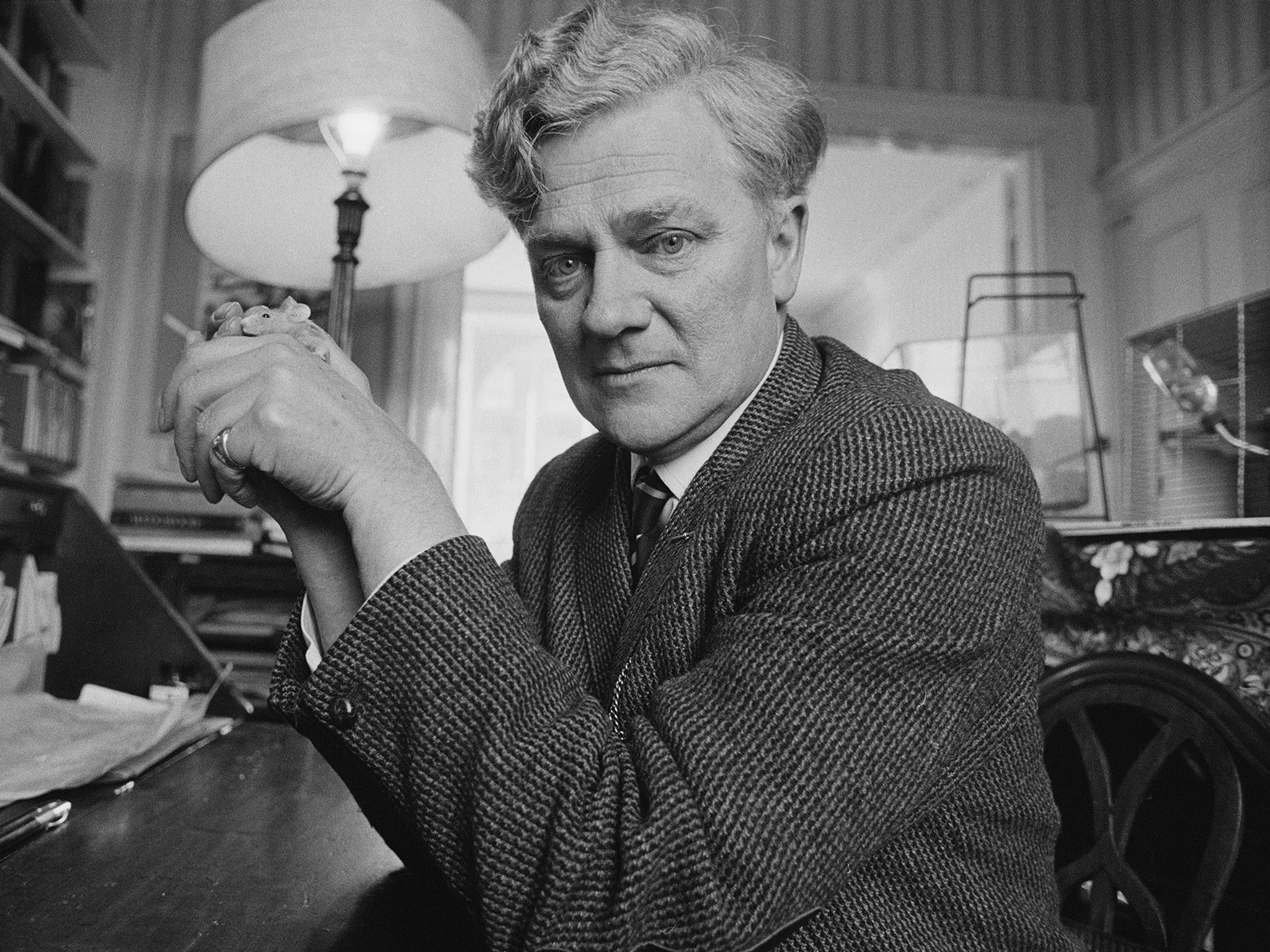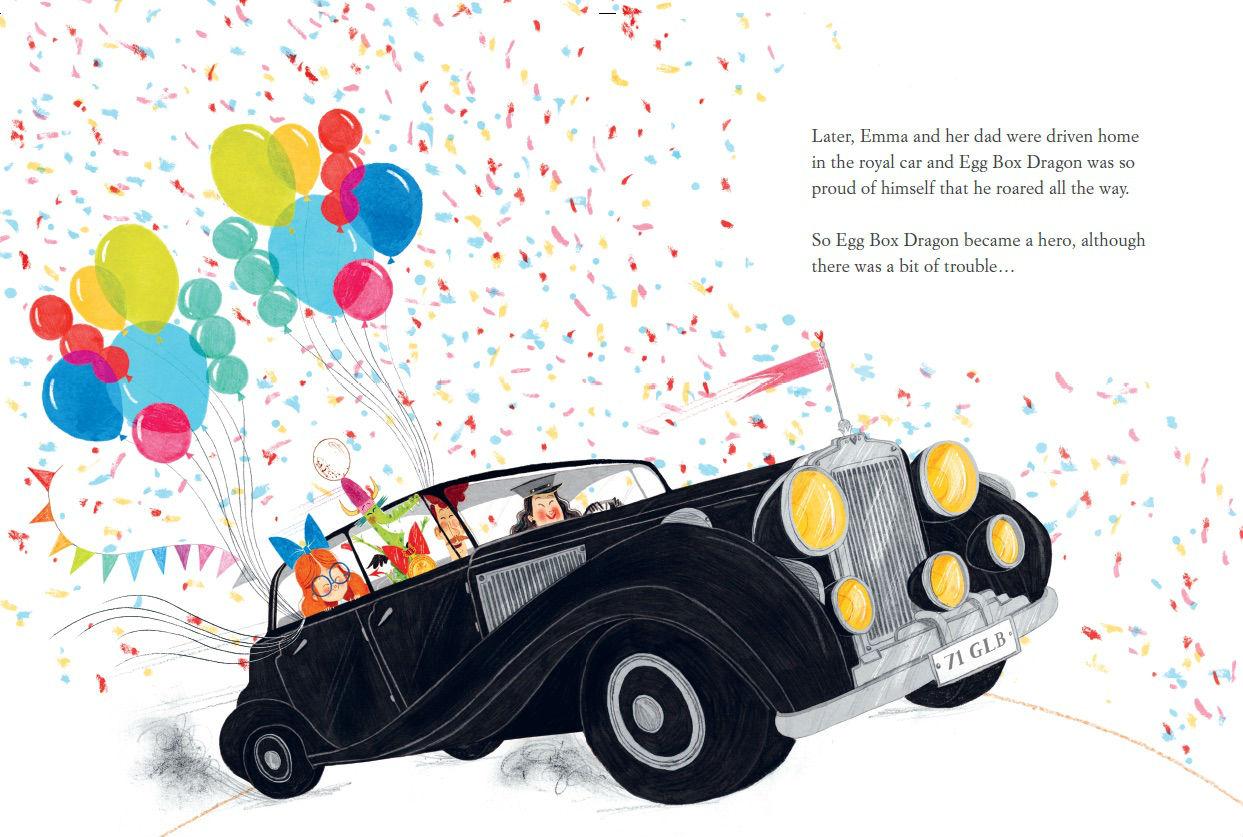How Watership Down's Richard Adams came to write a kid's picture book before he died
The late author's daughter Juliet convinced her father to write ‘The Adventures of Egg Box Dragon’, his first story for pre-schoolers and the last book he wrote before he died a year ago

Most people discover Richard Adams via the warrens of Watership Down. But a new picture book starring a dragon made from old egg cartons could change that for a new generation of readers. The Adventures of Egg Box Dragon is Adams’s first story for pre-schoolers and the last book he ever wrote. He died last December, aged 96.
“One nice sunny day, when Dad was 93 and having a good day, I shoved him into the dining room with a pad of paper and said, ‘Go on, write Egg Box Dragon!” says Juliet Johnson, who is chatting to me with her sister, Ros Mahony, from Juliet’s Oxford home.
Two hours later, he duly handed her his handwritten manuscript. (Adams abhorred typewriters: “Nasty noise. Clittery-clattery.”)
He based the “feisty” creature on a putative art project dreamt up by Juliet’s former teacher at Channing School, in Highgate, London. She had wanted to build a “huge 6ft, 8ft dragon out of egg boxes in the school’s basement. We never actually got round to making it but the idea triggered something in Dad’s mind,” Juliet remembers.

The Egg Box Dragon joined the likes of Hazel, Fiver and Bigwig, the stars of Watership Down, which Adams created to entertain his young daughters on car journeys or at bedtime. “He was always looking at things and having ideas and seeing possibilities. I’m told Roald Dahl was like that too,” adds Juliet.
“He was never short of a story. We’d say, ‘Dad, Tell us a story! Tell us a story!’ He’d think for a few minutes and then start off. It could be about anything. Mice or rabbits or kittens. Our favourites were Richard and Thomas kitten who used get in to scraps. And Blue Rabbit who was invisible. He did like characters with special powers.”
It took an old school friend, Lesley Young – the businesswoman behind the Heathcote & Ivory toiletries brand and daughter of the former BBC director general Stuart Young – to trigger Juliet’s memory about the dragon.
The result is a delightful children’s story, which leaps off the page thanks to illustrator Alex T Smith’s imaginative interpretation of Adams’s cheeky dragon, who has a knack for finding missing objects, from lunch money to the queen’s diamond.

Nods to Watership Down – one of the best-selling books of the past century, with an estimated 50 million copies in print in 18 languages worldwide – are scattered throughout Smith’s pictures. “You can say to children, ‘Tell me when you see a rabbit’,” adds Juliet, with a bonus prize for noticing the car’s number plate. “71GLB was our old car, the one we had when Dad told us the original, sketchy Watership Down tales – a rickety old red Volvo, with big googly eyes.
There’s a pleasing symmetry in Adams’s latter-day reincarnation as a picture book author given that the former civil servant didn’t start writing Watership Down until he was nearly 50. Even then it took years of perseverance to find a publisher: the late Rex Collings, a one-man publishing outfit, took the gamble, printing 2,500 copies in 1972. (“I’ve just taken on a novel about rabbits, one of them with extra-sensory perception. Do you think I’m mad?” Collings asked a friend at the time.) Rapturous reviews prompted Penguin to republish it under both the Puffin and Penguin imprints – in other words, for children and adults.
Just months before he died, I met Adams for what transpired was his last interview. He lived with his wife, Elizabeth, in a rambling red-bricked house in Whitchurch, north Hampshire, not from the hill that was home to his famous rabbits.
I was lucky: the ruddy-cheeked writer, his white hair falling thickly across his lined forehead, was having another good day, thrilled to be chatting about his passion – books.

His head was bowed when I entered, his mind lost in a well-thumbed copy of Watership Down. The sitting room was a shrine to his lapine creations. Miniature china figurines choked shelves, jostling for space with bigger ceramic sculptures. There were even several gold Lindt bunnies glistening in the afternoon sun.
From a high-backed armchair, his voice rich and plummy, Adams revealed his trick for inventing tales. “It’s much easier to make up a story when it’s being demanded from you. The ones that are told to an audience, big or small, who are actually listening at the time, are the best stories, I think.”
That and sticking to animals. “Animals in stories mean everything to me. I don’t think I could write one in which an animal did not appear. Stories about animals are the oldest in the world. Usually with a kind of moral to them, like how the camel got his hump.”
At 95, time had rubbed soft some of his bombastic edge although Juliet later tells me how badly written books would frustrate him. “He’d say, ‘I could do better than this myself!’ One time he chucked a book across the room!”

In 1967, on an Easter holiday in the Lake District, the girls – aged seven and nine at the time – challenged him. “We were in Ulverston, a market town, with mum,” says Juliet, who like Ros is now a grandmother. “We bought him some awful, cheap paper with our pocket money and took it home and put it in front of him and said, ‘Prove you’re right! Write a better story than all the others.’ Boy did we get our bluff called!”
What became Watership Down, which described a group of rabbits’ struggle to create a new, utopian society after developers moved in on their land, took Adams around three years to write, given his day job. Eventual literary success allowed Adams to quit the civil service to write full time.
On that fresh, spring afternoon, as I sat sipping tea, Adams disappeared into his memories, swirling from the innocence of youth to the horror of war and back again. He credited his father’s gardener, “an excellent chap called Archer Thorn, who had a great influence on my childhood” for sparking his own knack for narration. “Thorn was always ready to chat or listen to a boy who kept him company. That was the beginning of stories.”
He grew up – in Newbury where his father was a doctor – with regular doses of Beatrix Potter from his mother, a nurse. “I can vividly remember sitting on her knee, after my bath, at bedtime, and she would read me a story by Beatrix Potter. I can honestly say that was what started me off being a reading, and later a writing, person. If you want to make a child or a young person fond of reading, the great thing is to read to them,” he told me.

His mother also took him to “the pictures” in Newbury. “From them I absorbed the idea of stories as dramatic adventures. You saw the story, and later you were able to write down ideas and stories.”
His flashbacks turned dark when he reached the war, which interrupted his student days at Oxford where he read Modern History at Worcester College. He served as a parachutist in the Royal Army Service Corps. “So many of my friends were killed in the war. It was an awful thing, the war. Worst war there’s ever been.”
His experience lives on in Watership Down. Quiet, polite Hazel was inspired by Adams’s commanding officer, Major John Gifford, and exhibitionist Bigwig by Captain Desmond “Paddy” Kavanagh, whom Adams described in his autobiography as a “sensationalist [who was] afraid of nothing”.
Although Kavanagh died in action during the battle of Arnhem in September 1944, which provides the backdrop for some of the rabbits’ darker encounters, Juliet remembers begging her father not to kill anyone in his story. “We stopped Bigwig being killed in a snare,” she adds.

A new four-part BBC adaptation of Watership Down, made with Netflix and voiced by stars including John Boyega, Rosamund Pike, Olivia Colman and James McAvoy, is due out next Christmas. It promises to be radically different from an animated version made in 1978, which is infamous for its terrifying battle scenes of ravaged rabbits.
“[The new version] won’t have quite the same shock value. I think Dad would have liked the beauty of the CGI graphics and the poignancy and the realism,” says Juliet.
In the meantime, there is always the book. “I had a letter the other day about Watership Down,” Juliet says. “It just made me well up. It changes people’s lives, that book. It speaks to people in a very direct emotional way. There is something about the journey and struggling against the odds. It’s taken some people on completely different paths.”
His former agent, Jacqueline Korn, remembers being “swept away” the first time she read Watership Down. She thinks publishers initially turned down the “huge unwieldy” manuscript because Adams had pitched it as a children’s book. And yet, she adds: “It has had a huge impact. The number of children that were drawn in to reading because of Watership Down was phenomenal. I think it will be an all-time classic.”
‘The Adventures of Egg Box Dragon’ by Richard Adams, illustrated by Alex T Smith, is published by Hodder Children’s Books
Join our commenting forum
Join thought-provoking conversations, follow other Independent readers and see their replies
Comments
Bookmark popover
Removed from bookmarks